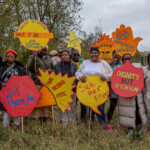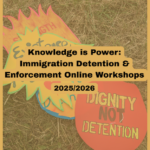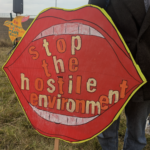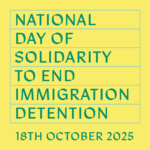The Borders, Security, Asylum and Immigration Bill (the ‘Bill’) is currently going through the different stages that every Bill must go through to become Law. It was originally introduced at the end of January 2025.
After that, it went through a number of stages in Parliament, where Members of Parliament (MPs) decided which bits to keep and which bits to change. It has now moved on to the House of Lords, where it will go through a similar process of different stages – before returning to the House of Commons.
There is still quite a long process to go. Once we know what the final Bill will look like, we will of course update you. For now, we will talk about some of what we are seeing so far. We are grateful to the many brilliant organisations that have written about the Bill – too numerous to mention – some of which we considered before writing this short article.
What does the Bill contain?
This is the first immigration Bill, of the current Labour government. So, it can give us an important understanding into the Government’s current and future intentions in relation to immigration control.
Sadly, that understanding feels pretty disappointing! This is a missed opportunity. More on that below.
There are some good things in the Bill.
For example, the much criticised and ridiculously called ‘Safety of Rwanda’ (Asylum and Immigration) Act 2024, has finally been repealed (thrown out). Readers will remember that this Act was found to be unlawful by the Supreme Court.
And there are lots of parts of the Bill that are potentially problematic.
The majority of the Bill is focused on immigration enforcement – stopping people from coming to the UK and punishing those that are connected with those journeys. This includes new criminal offences, such as:
- ‘Supplying and handling articles for use in immigration crime’. These articles include a very long list – food; drink; clothing; medicine; a tent or a phone. Almost anything that a desperate person fleeing to safety might need.
There is a defence within the Bill, of having a ‘reasonable excuse’ for providing these articles. This reasonable excuse could include that you are carrying out a rescue mission or acting for an organisation that aims to help asylum seekers and does not change for these services. So, those of you in roles supporting migrant communities should have access to these defences.
It is yet to be seen what will happen to those who are acting on their own to help others that need it. We will watch this carefully and update you as more information becomes apparent.
- ‘Endangering another during a sea crossing to the UK’
This is really aimed at those that come to the UK in ‘small boats’. At present, this offence can be applied to anyone. Not only those that make money from small boats crossings e.g. people smugglers. Also, those that come to the UK in order to access safety – so asylum seekers.
If this part stays in the Bill, it is likely to be targeted at those that may have ‘helped’ on the journey in some way, such as those that help by steering the boat to keep everyone onboard safe.
This is worrying, as when desperate people can’t afford the high fees that people smugglers charge, sometimes they are made the steer the boat in partial exchange for the journey. Others may be forced to steer the boat as victims of human trafficking.
It is not clear how this clause will be used to protect these groups of people. There are calls to include a clause that this should only be used where there is evidence that it is because of financial gain. We are yet to see if this will be included.
Another particularly worrying clause of the Bill expands the use of the ‘conditions’ that can be set when someone has limited leave to remain. At the moment the Home Office can impose certain conditions – such as restrictions on work and study for those with limited leave to remain.
This new clause gives much wider powers to impose conditions such as curfews and electronic tags and ‘such other conditions as the ‘Secretary of State thinks fit’. The Home Office say that they will only use these new clauses on someone who is a ‘danger to the public’ and cannot legally be removed.
But the Bill does not explicitly say this – so at any point, the Home Office could just change this policy without further oversight and expand the use of curfews and electronic tags to anyone with legal, but limited status – such as students or tourists.
We know from experience that we cannot trust the Home Office to follow the law when it is written down.
So, if it is not written down – we definitely need to very cautious.
What can we see from the Bill so far?
The Bill shows us that Labour’s policies on immigration are not really so different from the previous Tory government’s terrible policies. They are about creating more control, criminalising migrants and appearing to be tough on immigration.
Which really feels like a missed opportunity – especially for those that still hold out on ideas of justice in relation to immigration control from this Government.
This could have been an opportunity to show care and compassion as an incoming government. To recognise that we live in a world where there is much injustice and many are forced to travel to seek safety after horrific experiences. It should be about taking accountability for Britain’s part in creating these injustices. Not about pandering to the blatant racism we see across any conversation on immigration control.
As said above – the Bill is very disappointing!
This is especially so when this type of stance tends to increase levels of hatred and racism against migrant communities. We saw this clearly last summer, during the tragic race riots that exploded across the UK.
What should you do now?
We don’t know what will remain in this Bill as it continues to travel through the various stages. There are many doing a lot of work behind the scenes to try to dilute the worst parts of the Bill.
So, for now – let’s stay strong and not panic. We don’t know what will come of this Bill.
At Right to Remain, as soon as we do know – we will keep you updated.
So, take a breath – and remember to focus on what matters. Look up at the beautiful trees. Reach out to those around you – your friends, your families, your communities. And nurture them.
Know you are not alone.
In solidarity. With care. With respect!
Right to Remain













Discussion: